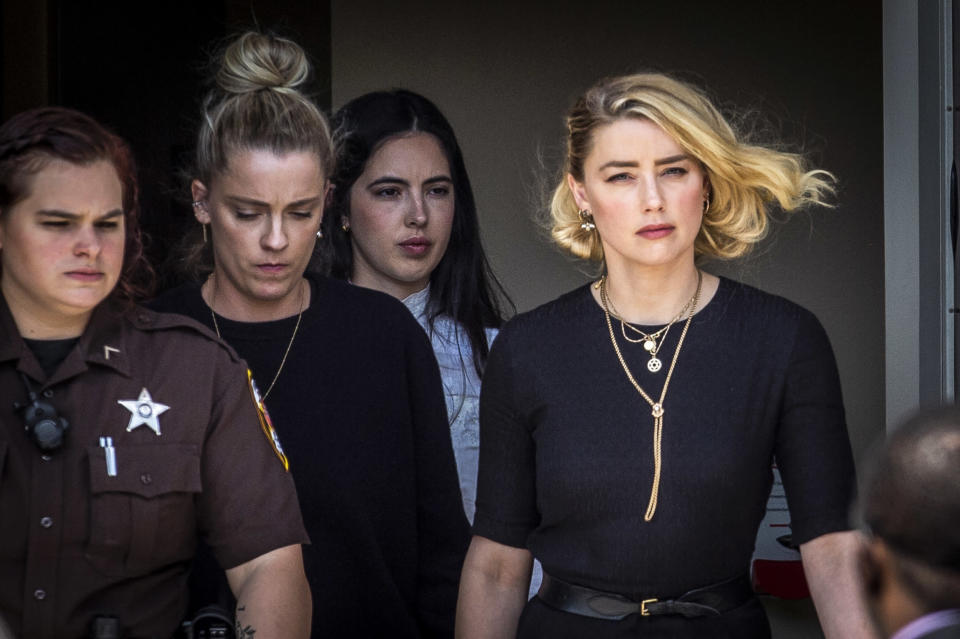Wednesday’s verdict favoring Johnny Depp in his trial against ex-wife Amber Heard is a setback for domestic violence victims that comes at an already delicate time for women’s rights, survivors and experts say.
As the high-profile trial dragged on for six weeks in a Virginia courtroom — centered on a 2018 Washington Post op-ed written by Heard in which she didn’t name Depp but called herself a “public figure representing domestic abuse” — it became a social media frenzy. Various media columnists said the trial represented the “death” of #MeToo, the movement that caught fire in 2017 and led to sweeping changes in various industries in which high-powered men had previously faced little to no consequences for inappropriate sexual behavior toward women.
Meanwhile, a Supreme Court draft opinion that would strike down Roe v. Wade was leaked, prompting Vice President Kamala Harris to say, “Women’s rights in America are under attack.” And Oklahoma passed the strictest abortion ban in the country.
“All of these attacks on women’s autonomy are connected,” said Nicole Bedera, a sociologist who studies sexual violence. “This is a hard moment. There is no way around it. It does feel like women are losing rights that previously felt pretty well-established.”


Heard and Depp’s trial prompted intense scrutiny, with many expressing doubt online about Heard’s claims that she was abused.
Heard, who was countersuing Depp, said in a statement on Twitter that she was heartbroken — not just for herself, but for other women, too.
“It’s a setback. It sets back the clock to a time when a woman who spoke up and spoke out could be publicly humiliated. It sets back the idea that violence against women is to be taken seriously,” she wrote.
Men experience intimate partner violence, as well, although it’s much more common in women, according to the National Coalition Against Domestic Violence.
With Heard and Depp’s case, progress that may have been made in encouraging domestic violence survivors to speak may now be on pause, Bedera said.
“Historically, survivors have always been concerned about naming their abusers publicly, but those concerns are intensified after this verdict, and that’s in large part because Amber Heard never did name Johnny Depp publicly as her abuser,” she said.
Alexandra Hunt, a domestic abuse survivor, said she feared the verdict could spur other claims of defamation. NBC News doesn’t normally identify victims of domestic violence, but Hunt gave permission to use her full name.
“I think this is going to become a playbook for abusers who are powerful people and who use their power to silence people from coming forward,” said Hunt, 29, of Philadelphia.
Even before the verdict, the way Heard had been portrayed in social media throughout the trial appeared to some to represent a backlash to the progress made by #MeToo.
The #MeToo organization declined to comment Thursday. In a statement on its website over the weekend, it ripped into critics who it said mischaracterized the #MeToo movement during the trial.
“The way in which #MeToo has been co-opted and manipulated during the Johnny Depp vs. Amber Heard trial is a toxic catastrophe and one of the biggest defamations of the movement we have ever seen,” the statement read, adding that the trial didn’t even center on sexual violence, the premise on which #MeToo was built.
“What we experienced in the Depp-Heard trial was a public retelling of intimate partner violence between two privileged white celebrities. And the accounts are as equally harrowing as the public humiliation and harassment” of Heard, the statement added. “It is a case study for how social and political movements get misused and weaponized against the very people it’s meant to serve.”
Before the verdict, survivors who supported Heard said they would, in some cases, refrain from posting much about the case on social media out of fear of being attacked by Depp’s fans. Hunt said that after she tweeted her concerns about the verdict, she began getting backlash.
She said watching the public discourse unfold was horrifying.
“After seeing the way that social media turned and the public turned on Amber Heard, this was a stoning. This was a modern-day stoning,” Hunt said.
Not all survivors supported Heard, with some saying they thought she was lying and therefore discrediting other survivors.
Experts say being accused of lying or of exaggerating domestic violence is one of many reasons those who experience it don’t speak up about it.
It is rare to lie about being a victim of domestic violence, said Twahna P. Harris, the founder, CEO and executive director of The Butterfly Society, a nonprofit domestic violence organization in Baton Rouge, Louisiana.
She said she hoped that the overarching belief that Heard lied, combined with the jury’s verdict, wouldn’t dissuade people from speaking out against abusers.
“Please, don’t allow this situation, this moment in history, to prevent you from doing what you have to do,” she said. “You have a right to speak your truth.”
Hunt said the verdict in Heard and Depp’s case has highlighted how much work still needs to be done to set up a system that is fair to survivors.
“I don’t think at any point were we survivors successful at changing the system to favor us and to believe our stories and to protect us and to protect other people from becoming survivors,” she said.
The verdict didn’t surprise Bedera, either.
“We know that our legal system is biased in a lot of ways toward victims of gender-based violence, and a lot of them were very clearly on display in this trial,” she said.
If you or someone you know is facing domestic violence, call the National Domestic Violence hotline for help at (800) 799-SAFE (7233), or go to www.thehotline.org for more. States often have domestic violence hotlines, as well.




